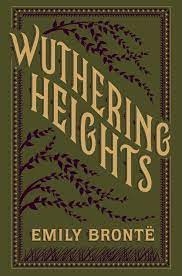Wuthering Heights Page #4
Wuthering Heights is an 1847 novel by Emily Brontë, initially published under the pseudonym Ellis Bell. It concerns two families of the landed gentry living on the West Yorkshire moors, the Earnshaws and the Lintons, and their turbulent relationships with Earnshaw's adopted son, Heathcliff.
“Ah, certainly—I see now: you are the favoured possessor of the beneficent fairy,” I remarked, turning to my neighbour. This was worse than before: the youth grew crimson, and clenched his fist, with every appearance of a meditated assault. But he seemed to recollect himself presently, and smothered the storm in a brutal curse, muttered on my behalf: which, however, I took care not to notice. “Unhappy in your conjectures, sir,” observed my host; “we neither of us have the privilege of owning your good fairy; her mate is dead. I said she was my daughter-in-law: therefore, she must have married my son.” “And this young man is—” “Not my son, assuredly.” Heathcliff smiled again, as if it were rather too bold a jest to attribute the paternity of that bear to him. “My name is Hareton Earnshaw,” growled the other; “and I’d counsel you to respect it!” “I’ve shown no disrespect,” was my reply, laughing internally at the dignity with which he announced himself. He fixed his eye on me longer than I cared to return the stare, for fear I might be tempted either to box his ears or render my hilarity audible. I began to feel unmistakably out of place in that pleasant family circle. The dismal spiritual atmosphere overcame, and more than neutralised, the glowing physical comforts round me; and I resolved to be cautious how I ventured under those rafters a third time. The business of eating being concluded, and no one uttering a word of sociable conversation, I approached a window to examine the weather. A sorrowful sight I saw: dark night coming down prematurely, and sky and hills mingled in one bitter whirl of wind and suffocating snow. “I don’t think it possible for me to get home now without a guide,” I could not help exclaiming. “The roads will be buried already; and, if they were bare, I could scarcely distinguish a foot in advance.” “Hareton, drive those dozen sheep into the barn porch. They’ll be covered if left in the fold all night: and put a plank before them,” said Heathcliff. “How must I do?” I continued, with rising irritation. There was no reply to my question; and on looking round I saw only Joseph bringing in a pail of porridge for the dogs, and Mrs. Heathcliff leaning over the fire, diverting herself with burning a bundle of matches which had fallen from the chimney-piece as she restored the tea-canister to its place. The former, when he had deposited his burden, took a critical survey of the room, and in cracked tones grated out—“Aw wonder how yah can faishion to stand thear i’ idleness un war, when all on ’ems goan out! Bud yah’re a nowt, and it’s no use talking—yah’ll niver mend o’yer ill ways, but goa raight to t’ divil, like yer mother afore ye!” I imagined, for a moment, that this piece of eloquence was addressed to me; and, sufficiently enraged, stepped towards the aged rascal with an intention of kicking him out of the door. Mrs. Heathcliff, however, checked me by her answer. “You scandalous old hypocrite!” she replied. “Are you not afraid of being carried away bodily, whenever you mention the devil’s name? I warn you to refrain from provoking me, or I’ll ask your abduction as a special favour! Stop! look here, Joseph,” she continued, taking a long, dark book from a shelf; “I’ll show you how far I’ve progressed in the Black Art: I shall soon be competent to make a clear house of it. The red cow didn’t die by chance; and your rheumatism can hardly be reckoned among providential visitations!” “Oh, wicked, wicked!” gasped the elder; “may the Lord deliver us from evil!” “No, reprobate! you are a castaway—be off, or I’ll hurt you seriously! I’ll have you all modelled in wax and clay! and the first who passes the limits I fix shall—I’ll not say what he shall be done to—but, you’ll see! Go, I’m looking at you!” The little witch put a mock malignity into her beautiful eyes, and Joseph, trembling with sincere horror, hurried out, praying, and ejaculating “wicked” as he went. I thought her conduct must be prompted by a species of dreary fun; and, now that we were alone, I endeavoured to interest her in my distress. “Mrs. Heathcliff,” I said earnestly, “you must excuse me for troubling you. I presume, because, with that face, I’m sure you cannot help being good-hearted. Do point out some landmarks by which I may know my way home: I have no more idea how to get there than you would have how to get to London!” “Take the road you came,” she answered, ensconcing herself in a chair, with a candle, and the long book open before her. “It is brief advice, but as sound as I can give.” “Then, if you hear of me being discovered dead in a bog or a pit full of snow, your conscience won’t whisper that it is partly your fault?” “How so? I cannot escort you. They wouldn’t let me go to the end of the garden wall.” “You! I should be sorry to ask you to cross the threshold, for my convenience, on such a night,” I cried. “I want you to tell me my way, not to show it: or else to persuade Mr. Heathcliff to give me a guide.” “Who? There is himself, Earnshaw, Zillah, Joseph and I. Which would you have?” “Are there no boys at the farm?” “No; those are all.” “Then, it follows that I am compelled to stay.” “That you may settle with your host. I have nothing to do with it.” “I hope it will be a lesson to you to make no more rash journeys on these hills,” cried Heathcliff’s stern voice from the kitchen entrance. “As to staying here, I don’t keep accommodations for visitors: you must share a bed with Hareton or Joseph, if you do.” “I can sleep on a chair in this room,” I replied. “No, no! A stranger is a stranger, be he rich or poor: it will not suit me to permit any one the range of the place while I am off guard!” said the unmannerly wretch. With this insult my patience was at an end. I uttered an expression of disgust, and pushed past him into the yard, running against Earnshaw in my haste. It was so dark that I could not see the means of exit; and, as I wandered round, I heard another specimen of their civil behaviour amongst each other. At first the young man appeared about to befriend me. “I’ll go with him as far as the park,” he said. “You’ll go with him to hell!” exclaimed his master, or whatever relation he bore. “And who is to look after the horses, eh?” “A man’s life is of more consequence than one evening’s neglect of the horses: somebody must go,” murmured Mrs. Heathcliff, more kindly than I expected. “Not at your command!” retorted Hareton. “If you set store on him, you’d better be quiet.” “Then I hope his ghost will haunt you; and I hope Mr. Heathcliff will never get another tenant till the Grange is a ruin,” she answered, sharply. “Hearken, hearken, shoo’s cursing on ’em!” muttered Joseph, towards whom I had been steering. He sat within earshot, milking the cows by the light of a lantern, which I seized unceremoniously, and, calling out that I would send it back on the morrow, rushed to the nearest postern.
Translation
Translate and read this book in other languages:
Select another language:
- - Select -
- 简体中文 (Chinese - Simplified)
- 繁體中文 (Chinese - Traditional)
- Español (Spanish)
- Esperanto (Esperanto)
- 日本語 (Japanese)
- Português (Portuguese)
- Deutsch (German)
- العربية (Arabic)
- Français (French)
- Русский (Russian)
- ಕನ್ನಡ (Kannada)
- 한국어 (Korean)
- עברית (Hebrew)
- Gaeilge (Irish)
- Українська (Ukrainian)
- اردو (Urdu)
- Magyar (Hungarian)
- मानक हिन्दी (Hindi)
- Indonesia (Indonesian)
- Italiano (Italian)
- தமிழ் (Tamil)
- Türkçe (Turkish)
- తెలుగు (Telugu)
- ภาษาไทย (Thai)
- Tiếng Việt (Vietnamese)
- Čeština (Czech)
- Polski (Polish)
- Bahasa Indonesia (Indonesian)
- Românește (Romanian)
- Nederlands (Dutch)
- Ελληνικά (Greek)
- Latinum (Latin)
- Svenska (Swedish)
- Dansk (Danish)
- Suomi (Finnish)
- فارسی (Persian)
- ייִדיש (Yiddish)
- հայերեն (Armenian)
- Norsk (Norwegian)
- English (English)
Citation
Use the citation below to add this book to your bibliography:
Style:MLAChicagoAPA
"Wuthering Heights Books." Literature.com. STANDS4 LLC, 2025. Web. 14 Mar. 2025. <https://www.literature.com/book/wuthering_heights_1627>.








Discuss this Wuthering Heights book with the community:
Report Comment
We're doing our best to make sure our content is useful, accurate and safe.
If by any chance you spot an inappropriate comment while navigating through our website please use this form to let us know, and we'll take care of it shortly.
Attachment
You need to be logged in to favorite.
Log In